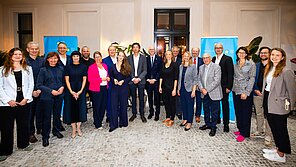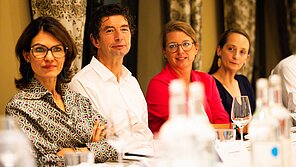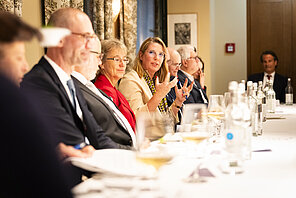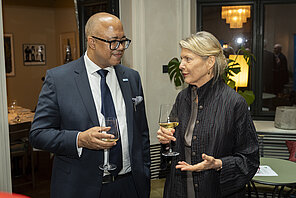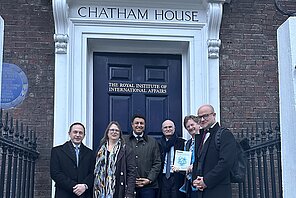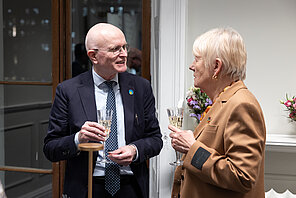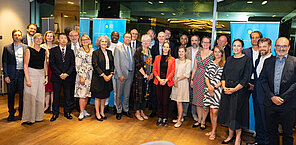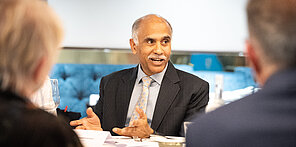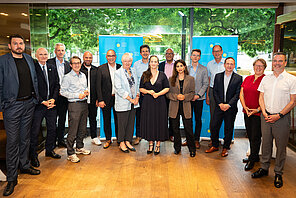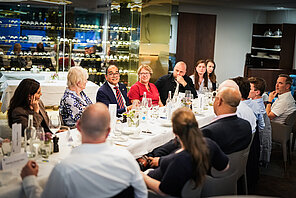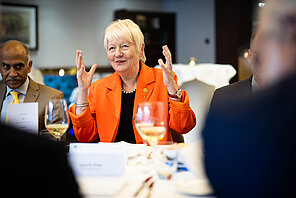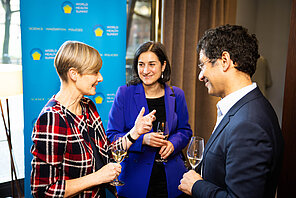WHS Global Health Dialogues
The WHS Global Health Dialogues bring together thought-leaders and decision-makers throughout the year to discuss a wide range of global health issues in an exclusive and intimate setting. By taking on a political-strategic focal point, the Global Health Dialogues are developed in the context of relevant global health events like the G7/G20 conferences or UN High-Level meetings, putting global health on the agenda of international politics, and complementing the central topics of the World Health Summit.
Global Health Dialogue, September 9, 2024
"Bridging the Trust Deficit – Trust in Science"
In the final WHS Global Health Dialogue on the issue of “Trust” leading up to the World Health Summit 2024, high-level representatives from academia, media, politics, civil society and the private sector came together to debate how the COVID-19 pandemic exposed both the vital role science plays in shaping public policy and the uncertainties that fueled public confusion and skepticism.
The discussion emphasized the need for a scientific code of conduct that would ensure greater transparency and consistency in communicating findings, in addition to maintaining high standards in media coverage. Participants underscored the importance of coordinated efforts between scientists and the media to build trust in the public, particularly among those with unsettled opinions.
Science is essential in countering the rise of alternative facts and misinformation campaigns. Participants stressed the importance of engaging the public in a way that acknowledges the complexities of scientific research without oversimplifying. In this context, pro-active science communication, leaving less room for populist voices, and addressing the public through non-traditional media are key elements in bridging the gap between the scientific community and the public, fostering trust, and countering skepticism.
Global Health Dialogue, April 9, 2024
"Towards Sustainable Financing - The WHO Investment Round"
All for Health, Health for All – an update on the WHO 25-28 strategy and investment round
Spurred by the need to accelerate progress towards the health-related Sustainable Development Goals in an unstable world with profound implications for health, this year’s World Health Organization investment round is a key moment to move WHO’s finances towards more predictability and flexibility. The World Health Summit created an intimate setting for representatives to gain valuable insights on WHO’s first investment round from Catharina Boehme, Assistant Director-General for External Relations and Governance.
At the 77th World Health Assembly in Geneva, WHO will launch a strategy that aims to help billions of people lead a healthy life. To achieve its ambitious goals for a healthier world and deliver the tangible outcomes, WHO is looking to diversify its donor basis, establish longer-term financing, and create more flexibility in the use of its fund
With high-level representatives from various German ministries and European embassies present, Catharina Boehme stressed the importance of regional champions, and in particular the support of “Team Europe”, in this novel path towards sustainable financing for WHO. “Deep divides run through the world we live in today, as we are experiencing in the pandemic accord negotiations. This investment round can help build important bridges across these divides as we come together in a common understanding of health as an investment towards healthy, equal and fair societies,” she highlighted.
Global Health Dialogue, February 29, 2024
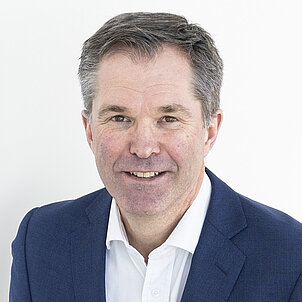
“Science is one of our most powerful tools to change the world, but it needs society’s trust. At Wellcome, we support the role science has to play in addressing the world’s urgent health challenges. That gives us particular interest in science’s role in building and brokering trust across society and its role in informing policies.”
John-Arne Røttingen
CEO, Wellcome Trust
Global Health Dialogue, September 7, 2023
"Recommitting to Universal Health Coverage"
In partnership with Gavi, The Vaccine Alliance, The Global Fund To Fight AIDS, Tuberculosis and Malaria, and UNICEF
Universal health coverage (UHC) is crucial to reaching “SDG 3: Good Health and Well-being for all”, yet the progress towards it has stalled in recent years, to large parts due COVID-19. Scaling up political commitment across the globe will be central to achieving UHC.
Together with Gavi, The Vaccine Alliance, The Global Fund To Fight AIDS, Tuberculosis and Malaria, and UNICEF, the World Health Summit hosted its third WHS Global Health Dialogue this year with selected high-level guests from politics, academia, civil society and the private sector for an open discussion on how to recommit to universal health coverage.
Practical solutions, including the use of telemedicine as well as open-source digital health solutions, will be key accelerators of UHC progress on which the ambassadors of India and Kenya shared valuable examples. The civil society representatives stressed not only the importance of transparency and involvement of civil society in high-level meetings, but also equal and respectful partnerships towards UHC.
"The issue of strengthening country systems is critical. If this isn't done, it’s all just a game."
Tom Amolo
Ambassador, Embassy of Kenya, Germany
"If you want to distribute vaccines in an equitable way, which is essential to universal health coverage, you need to ask yourself first where vaccines are manufactured."
Guillaume Grosso
Director, Sovereign & Private Sector Engagement, Donor Relations & Campaigns, Gavi, The Vaccine Alliance
"At the heart of universal health coverage are the health care workers and we have to ensure they are safe, secure and funded."
Tina Rudolph
Subcommittee on Global Health, German Bundestag
"As long as there are deliberate attacks on health system structures, universal health coverage is unattainable."
Florian Westphal
CEO, Save the Children Germany
Global Health Dialogue, June 22, 2023
"Harnessing the Power of Digital Technologies for Health"
Digital technologies can be a key driver towards Universal Health Coverage and health equity, yet much remains to be done to achieve these goals. The noticeable urgency to collaborate across borders and across sectors for common digital solutions among all stakeholders while acknowledging the need for interoperability and data privacy was a key result of the WHS Global Health Dialogue on “Harnessing the Power of Digital Technologies for Health”.
Since digital technologies are transforming health care to an unprecedented extent and the power of digital technologies is becoming increasingly relevant in health systems worldwide, the World Health Summit invited high-level speakers and guests from politics, civil society, industry, and academia to discuss various aspects relating to digital health.
"The opportunity cost of not using data is far too high."
Thomas Renner
Subdivision Head, Digital & Innovation, Ministry of Health, Germany
"Whatever new things we bring in, we always have to be respectful towards the things that exist already, even if they do not work particularly well."
Chikwe Ihekweazu
Assistant Director-General, Division of Health Emergency Intelligence and Surveillance Systems, World Health Organization (WHO)
"The World Health Summit is, next to the World Health Assembly, the most important gathering in the year where public and private sectors come together."
Götz Gottschalk
Head of Health, YouTube Germany
"Political will is key. Political will comes to what is the priority. Political will has to be supported by enabling policies."
Igor Cesar
Ambassador, Embassy of Rwanda, Germany
Global Health Dialogue, April 27, 2023
"2023: A Defining Year for Global Health Action and Rethinking the Global Health Landscape"
2023 is a pivotal year for global health – as reflected in the theme for this year's World Health Summit. Many high-level events are scheduled for this year and WHO celebrates its 75th anniversary. To take global health to a new level, cooperation between G7/G20 decision-makers, policymakers, academia, and the private sector is more critical than ever.
At the WHS Global Health Dialogue "2023: A Defining Year for Global Health Action and Rethinking the Global Health Landscape", ambassadors from the current presidencies of G7 (Japan) and G20 (India) gave insights on the country's global health priorities under their leadership and the French ambassador explained the recently adopted European Global Health Strategy. The participants of the WHS Global Health Dialogue, key players from academia, politics, industry, and civil society, agreed on the need to strengthen multilateral collaboration, particularly between the North and South, and reducing fragmentation between global health actors.
"Berlin should take a leading role in bringing together people in global health."
Axel R. Pries
President, World Health Summit
"We strongly advocate for a greater share in multilateral cooperation to avoid the fragmentation in international health systems."
François Delattre
Ambassador, Embassy of France, Germany
"I think on the issue of health, national leaders have a direct obligation to their citizens."
Harish Parvathaneni
Ambassador, Embassy of India, Germany
